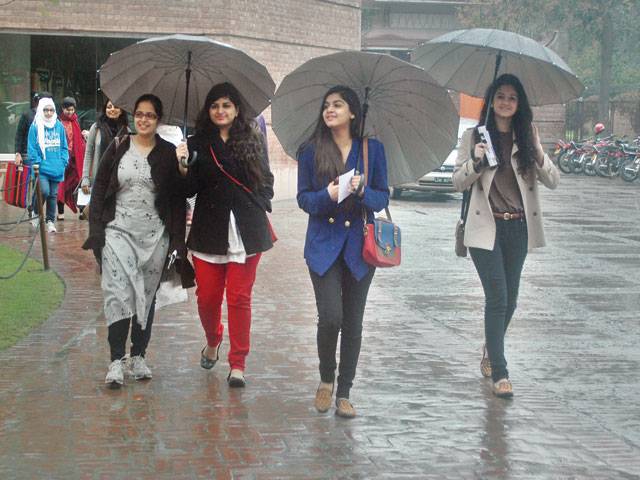LAHORE – Literary activity in the cultural capital of Pakistan was brought back to life as the first Lahore Literary Festival began with a full-swing at Alhamra on Saturday.
The two-day festival comprises of different sessions on wide-range of topics, attracting a large number of people especially youth. Focusing on literature as encompassing a variety of genres—from fiction writing to history‚ politics‚ art‚ architecture‚ culture and music—the festival aimed at returning Lahore’s rich literary tradition.
On the occasion, Alhmara was completely occupied, depicting the enthusiasm of the people for the festival. The festival brought together more than 50 noted writers and historians from Pakistan and abroad, who discussed over history‚ film‚ music‚ news media and culture.
On Saturday’s sittings on ‘Politics and Culture: Past and Present’ and ‘Pakistan: A Modern Country’ well-known writer Tariq Ali highlighted historical, political, and social aspects of literature.
“Culture, literature and history played an important role in the development of the nations. The nations having strong civilizations progressed speedily, adding the Muslim states like Pakistan would have to follow y work on basic principles for making progress.”
He said that extremism and sectarianism was a major hurdle in the development of Pakistan. He said that imperial forces had always tried to bring other nations under their control for interest in the global world of capital system but the nations that had strong civilization and culture were never hoodwinked by them. He said that China had key importance in this age which had made progress speedily becoming an example for the whole world.
Tariq Ali said that obvious changes had been brought in economic markets of the world in the beginning of 21st century and centre of power was also being changed. He said it was a tragedy of the developing countries that the resources of these countries were utilized only for a special segment of the society while masses were deprived of even basic needs. He said that a better society could be set up in Pakistan by bringing clear changes in education system. He said that Pakistani youth should also be aware of the history of the country along with acquiring expertise in English language and technology and should adopt a strategy for future while keeping in view the sacrifices of the past. He said that so called broadminded people and independent media had neglected the agenda of Kashmir dispute while the developed nations never forget sacrifices of their elders. He said that the young generation should also study books along with using internet facilities as only conscious people constitute a civilized society. “Drone attacks in tribal areas are destabilising the country,” he was of the view.
Famous novelist Bapsi Sidhwa‚ Intizar Hussain‚ historian William Dalrymple‚ Sri Lankan writer Shehan Karunatilaka‚ Mohammad Hanif‚ Moni Mohsin‚ Shazaf F Haider‚ Anam Zakaria‚ Haroon Khlaid‚ Kanza Javed‚ Pran Nevile‚ Basharat Peer‚ Sarah Singh‚ Naveed Shahzad‚ Zehra Nigah‚ Lyse Doucet‚ Selma Dabbagh‚ Hameed Haroon‚ Mohammad Jamal and Hassan Zaidi addressed the various sittings.
The Sri Lankan writer Shehan Karunatilaka talked about his book “Chinaman-The Legend of Pradeep Mathew” with Owen Bennett-Jones. Hameed Haroon and Hasan Zaidi discussed on film‚ news media and music‚ among other forms of expressions at a session ‘The Holy Warrior and the Enemy (1958-2008)’. Short Story writer Daniyal Mueenuddin‚ art and architecture critic Ebba Koch‚ poet‚ novelist and musician Jeet Thayil and novelist HM Naqvi were the panellists in a session titled “A Sense of Place”.
Panellists including Mohammad Hanif‚ Moni Mohsin‚ Shazaf F Haider and Shehan Karunatilaka addressed a session ‘On Satire’. While, Mohammad Jamal and Raza Rumi talked about translating the poetry of legendry Urdu poet Faiz Ahmad Faiz.
A Mehfil-e-Mushaira was also held in the evening of the first day of the festival wherein poets belonging to famous literary organisation—Halqa-e-Arbab-Zauq—read their poetry to the audience. Later, Nahid Siddiqui performed Kathak dance.
Friday, April 19, 2024
Literary light in cultural capital

Arshad Bhatti
Mehwish Hayat says she would like to work with Aamir Khan
9:59 PM | April 18, 2024
'That'll be awesome,' Rohit Sharma on idea of Pakistan vs India Test series
9:17 PM | April 18, 2024
Turkiye commends Pakistan's efforts in fostering regional peace
9:03 PM | April 18, 2024
CM Maryam's security squad hits biker to death in Narowal
9:02 PM | April 18, 2024
Hafiz Naeemur Rehman sworn in as new emir of Jamaat-e-Islami
8:54 PM | April 18, 2024
Hepatitis Challenge
April 18, 2024
IMF Predictions
April 18, 2024
Wheat War
April 18, 2024
Rail Revival
April 17, 2024
Addressing Climate Change
April 17, 2024
Justice denied
April 18, 2024
AI dilemmas unveiled
April 18, 2024
Tax tangle
April 18, 2024
Workforce inequality
April 17, 2024
New partnerships
April 17, 2024
ePaper - Nawaiwaqt
Advertisement
Nawaiwaqt Group | Copyright © 2024





